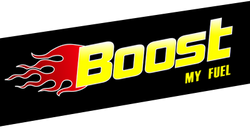Combustion Catalyst - A catalyst of any type is something that will speed up a reaction or allow a reaction to take place at a lower temperature. In our case the catalyst lowers the ignition temperature of carbon that normally ignites around 1200 degrees F to a temperature of about 800 degrees. Therefore allowing for a more complete burn of individual hydrocarbons.
By producing a more complete burn, the most available BTUs (energy) in that gallon or lb. of fuel will be used. It does not increase BTUs but allows the combustion process to convert more of the available BTUs into energy.
BOOST lowers the ignition temperature of the Hydrocarbon by 400 degrees Farenheit, or 204 degrees Celsius.
By burning hydrocarbons more completely there is less unburned or partially burned fuel going up a stack in the form of particulate emissions.
Polymerization Retardant (Stabilizers) - Repolymerization is a fancy word for the re-formation of polymers of fuel...what we fondly call sludge, black crap etc. Oxidation Stability is one form of stability as Thermal(heat) stability is another form of stability. Both of these have been widely known and accepted as THE stability triggers for years.
However, Repolymerization stability is much lesser known and that goes back to our studies 60 years ago. Our little window of expertise came out of these studies and has allowed us to develop a product many years ago that was proven to industry leaders, the US Navy and fuel users nationwide.
Even if you control oxidation, fuel has other natural chemical triggers that allow it to produce fuel particulate(hydrocarbons that have stuck together).
Diesel fuel today is subject to extreme amounts of pressure and temperatures during the refining process to get the sulfur out and down to 15ppm max that in short order the natural chemical activity of fuel begins to produce solids, and particulate.
Our stability package stops the natural process of fuel to generate solids of itself...once again simply hydrocarbons(fuel) sticking together. Fuel is very dynamic and fragile these days and isn't happy staying the way it is when immediately leaving the refinery. This part of our package is what allows diesel fuel to stay reliable in storage for long periods of time.
Detergent - This component is one of the components that will keep injectors from fouling with deposits and keep the entire fuel metering and storage system clean.
Organic Dispersants - This is the other component that will keep fuel free of particulate and keep injectors clean by dispersing particulate(solids, gums, varnishes) down to sub-micronic levels that will not allow it to foul equipment.
Demulsifier - Allows water to drop out of fuel. The opposite of an emulsifier - (Emulsifiers will try to mix water and fuel) The normal water content of fuel can be like 75ppm up to 150 ppm with no adverse affects as it is simply part of the fuel. When there is more water present than normal, the demulsifier will squeeze water out of the fuel, and not allow it to mix with the fuel.
The chemical qualities of the demulsifier changes the surface tension of water, by not allowing water and fuel to mix. And any accumulation of water in a fuel storage tank, will make sure the fuel and water are kept separate.
Corrosion Inhibitor - This component is a very effective film forming corrosion inhibitor that provides over time a boundary layer of corrosion inhibition to all fuel wetted metallic components.
Lubricants - There are lubricants in the additive package to enhance the lubricating qualities of diesel fuel...especially ULSD.

